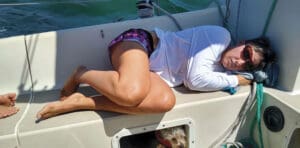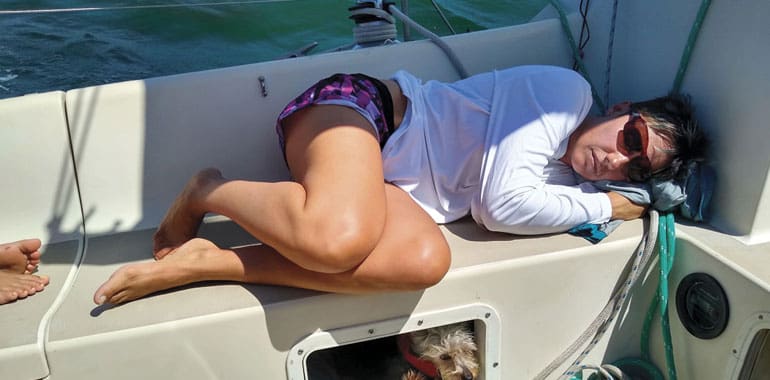
How can it be that something you love to do makes you sick?
The ocean is a fickle host, at times benevolent and mild, then obstreperous and cruel — often within moments of each other. One minute you’re in the galley, chewing the fat with the cook and then in a flash you’re bent over the taffrail feeding the fish — wishing you were dead.
During a race up the coast of Florida last year on a J-29, the boat owner was a seat-of-the pants type of “purist” sailor and didn’t carry charts. It was a robust day and we were shipping a lot of seawater, so I kept my cellphone with its chartplotting app in the saloon. I went below for a look at our position and before I knew it, I was … depositing the contents of my stomach before my stunned shipmates. Sorry guys.
Oh, dreaded mal de mer, my Achilles’ heel, why won’t you leave me be? It’s such an unfair and capricious affliction, crippling seasoned mariners while leaving random neophytes mostly unaffected. They say that seasickness has three fearful stages:
1. You are afraid you’re going to get sick.
2. You are afraid you’re going to die.
3. You are afraid you aren’t going to die.
A sizeable percentage suffers
Roughly one-third of a population is highly susceptible to motion sickness; there is no rhyme or reason as to who will suffer. My kids don’t even like sailing but are usually immune to the effects of seasickness. All they talk about is “when’s lunch?” Meanwhile, I’m trying to hold down breakfast. According to WebMD, people likely to suffer include:
• Women who are menstruating, pregnant or on hormone therapy.
• People who suffer migraines.
• Children younger than 12.
• People who take antibiotics, narcotics, asthma medications or antidepressants.
But if none of those apply to you, you’re not off the hook — you can still get sick out there.
Of course, this malady is nothing but a mind game, an incongruence in the body’s sensory systems: your eyeballs see a saloon that an hour ago was perfectly comfortable and steady, but now is being furiously rolled, pitched, heaved and yawed. It looks the same, but your inner ear feels the erratic motion and sends panic signals to the brain. One theory holds that the brain believes the queasy feeling is from a poison that has been ingested, and it gives the order to expel the contents of the stomach.
Especially upsetting is the knowledge that there is no way to stop the crazy motion and that it could go on for a long time, as it did for Charles Darwin who endured its effects for almost the entire five-year voyage aboard HMS Beagle, where he conducted preliminary research on his theory of evolution. “If a person suffer much from seasickness,” he wrote, “let him weigh it heavily in the balance. I speak from experience: it is no trifling evil which may be cured in a week.”
Symptoms include yawning, nausea, dizziness, vomiting, cold sweats, headaches, apathy, salivation and drowsiness; which, for most, usually dissipate within 72 hours of travel.
Prevention is always the best action. Refrain from caffeine, alcohol or a heavy meal before climbing aboard; drink plenty of water instead. Activities to avoid are smoking, going below or reading. Strong smells can quickly disable the heartiest sailor: While crossing Albemarle Sound in North Carolina a few years back, I ran out of fuel and dropped anchor as large, short-period waves battered our boat. While pouring diesel into the tank from a jerry jug, some of it splashed into the cockpit and within two minutes both my wife and I were dizzy and ready to hurl.
Remedies
Over-the-counter medications like Dramamine, Benadryl or Meclizine are effective when taken an hour before leaving the dock, or scopolamine patches (four hours prior to departure) can be obtained through a physician. Side effects of the scopolamine patches, however, include dizziness, drowsiness, headache and cold sweats — some of the same symptoms of seasickness, so it should be used with caution and never given to children (See sidebar).
Melanie Neale is owner of Sunshine Cruising Yachts in St. Augustine and has been living aboard most of her life. “I was the lucky one,” she said recently, “I never got seasick. On passages, I’ve found that Bonine is a better alternative to Dramamine because it doesn’t make you sleepy. And ginger — I know a lot of people who take ginger candy or ginger ale.”
Non-medicinal palliatives include getting a good night’s rest before going offshore, cold ginger ale and crackers, sucking on a lemon wedge, acupressure wrist bands or lying down with eyes closed and, of course, getting off the boat. And there is evidence that older mariners are less susceptible to seasickness — I guess aging really does have its benefits. For me, I’ve always felt better with a spell at the helm or as rail meat, staring at the horizon in the fresh air.
And don’t discount the power of your mind. A study by the American Psychological Association found that positive self-talk can be effective in fending off seasickness; you can literally talk yourself out of getting sick. Verbal placebos like, “I’m going to enjoy this voyage, and I will not get sick today,” really work.
So, I guess until they find the perfect palliative, I’ll have to continue accepting the common risks associated with the ocean: getting cold, getting wet and getting seasick. n
Robert Beringer is a marine journalist/photographer and author of Water Power! To order a copy, go to www.barnesandnoble.com/w/water-power-robert-beringer/1121938666?ean=2940151920025.

